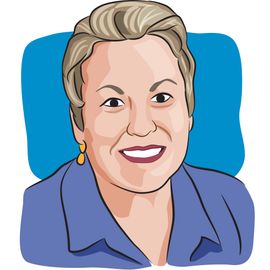- About Us
- Advertise / Support
- Editorial Board
- Contact Us
- CancerNetwork.com
- TargetedOnc.com
- OncLive.com
- OncNursingNews.com
- Terms & Conditions
- Privacy
- Do Not Sell My Information
- Washington My Health My Data
© 2025 MJH Life Sciences™ and CURE - Oncology & Cancer News for Patients & Caregivers. All rights reserved.
v4n4 - Guiding Their Way

Kathy LaTour is a breast cancer survivor, author of The Breast Cancer Companion and co-founder of CURE magazine. While cancer did not take her life, she has given it willingly to educate, empower and enlighten the newly diagnosed and those who care for them.
The patient navigator program, created and implemented by Harold Freeman, MD, for the women of Harlem, has now received funding for duplication across the country for cancer patients.
The Healthcare Association of New York State and Pfizer, Inc. collaborated with Dr. Freeman to develop the unique toolkit called Patient Navigation in Cancer Care: Guiding Patients to Quality Outcomes. The pilot navigator program in Harlem was the stimulus for other navigation programs for women with breast cancer in New York and across the country.
Funding for the distribution and implementation of the program comes from a number of sources. In June 2005, President Bush signed the Patient Navigator Outreach and Chronic Disease Prevention Act of 2005, bipartisan legislation that formally recognizes the challenges in overcoming disparities in detection, prevention and treatment of chronic diseases—including cancer. The act authorizes $25 million in federal grants for establishing patient navigator programs across the country.
“The grants will provide money to set up demonstration sites for patient navigation,” says Dr. Freeman, whose program at Harlem Hospital Center showed that one-on-one navigation could make the difference in whether or not women receive treatment.
The toolkit provides the organization sponsor or “champion” with guidance in promoting the program, as well as a training manual and resources for patient navigators. Navigators are chosen from the community and trained in how to overcome barriers for patients from the moment they have a suspicious finding. This includes navigating the healthcare system, finding financial assistance and recognizing cultural issues that have to be addressed. In essence, the newly diagnosed patient has a friend to walk with them each step of the way.
“It is important that no time is lost from the time of an initial finding, such as a screening examination,” Dr. Freeman says. “In poor communities many women who receive a mammogram and have abnormal findings are lost to follow-up or experience significant delays in diagnosis and treatment. ”
The Centers for Medicare & Medicaid Services matched the $25-million funding from the Act, and the Center to Reduce Cancer Health Disparities at the National Cancer Institute has also provided $25 million. “These monies, provided over five years with other private sector funds, mean a significant amount will be put toward this program,” Dr. Freeman says.
Pfizer will distribute Patient Navigation in Cancer Care to interested healthcare professionals through its sales force. For more information on the kit, go to www.patientnavigation.com, and for details on the grant submission process visit www.hhs.gov
Related Content:



